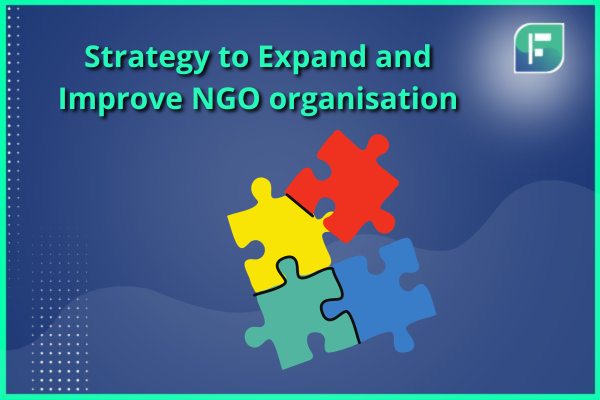A Non-Governmental Organisation or NGO is established to advocate for social welfare and ensure the underprivileged receive the rights they rightfully deserve. Applying for NGO registration is a crucial step to avail benefits. Strategising for the expansion and enhancement of an NGO plays a pivotal role in effective governance and management. It aids in achieving organisational goals and objectives while maximising outreach to people. Hence, in this article, we shall look into strategies to expand and improve NGO organisation.
What is Part of Strategy to Expand and Improve NGO Organisation?
As a part of strategy to expand and improve NGO organisation, the following need to be undertaken:
I. Review Your Current Practice
To lay the foundation for organisational expansion and improvement, NGOs must critically assess their existing practices. This involves:
1. Defining the Social Cause: Ensure clear communication of the NGO’s mission and the social issues it addresses.
2. Feedback Mechanism: Establish a feedback loop with beneficiaries to gather input and make necessary improvements.
3. Process Evaluation: Evaluate current operations to enhance efficiency.
II. Update the Budget Template
Creating a well-rounded budget is an important part of planning a strategy to expand and improve NGO organisation. For this, focus on:
1. Comprehensive Budget: Include costs for office space, staff training, fundraising, communication, and necessary resources.
2. Resource Diversification: Develop a budget that reduces reliance on single donors for long-term sustainability.
III. Develop a Sustainability Plan
Upon receiving funds, NGOs should create a practical sustainability plan, encompassing:
1. Action-Oriented Approach: Establish short-term goals, allocate tasks, and earmark budget resources.
2. Template and Instructions: Provide a standardised template and guidelines for effective planning.
IV. Emphasise Continuous Fundraising
A consistent fundraising approach is essential for NGO growth:
1. Continuous Fundraising: Prioritise ongoing fundraising efforts rather than waiting until funding is depleted.
2. Donor Engagement: Expand the donor network, maintain regular contact, and share updates on the NGO’s activities.
V. Provide Technical Support
Supporting NGOs in fundraising can be achieved through:
1. Donor Expertise: Donors can offer fundraising expertise, critique applications, and provide valuable feedback on reports and proposals.
VI. Foster NGO Partnerships
NGOs can enhance their capacity by collaborating in consortiums:
1. Consortium Approach: Encourage NGOs to apply jointly, fostering knowledge sharing and resource mobilisation.
2. Grassroots- High Capacity Partnerships: Partner local NGOs with larger, international NGOs for capacity development.
VII. Utilise Donor Networks
Expand support by tapping into existing donor networks:
1. Network Utilisation: Utilise peer connections and referrals rather than cold-calling potential donors.
2. Co-Funding Initiatives: Pitch co-funding opportunities to other donors interested in specific programs.
VIII. Maintain Flexibility
NGOs should adapt their financial management to ensure long-term viability:
1. Budget Flexibility: Allocate a portion of the budget to sustainability activities, facilitating expansion and improvement.
IX. Prioritise Quality Over Lowest Budget
Seek value for money instead of cost-cutting:
1. Value-Centric Approach: Balance the budget while ensuring quality, which is vital for long-term NGO success.
X. Communicate Effectively
Effective communication is essential for sustainability:
1. Regular Updates: Keep stakeholders informed about challenges, cash flow, available budget, donor outreach, and future funding prospects.
2. Solicit Feedback: Actively seek feedback and suggestions to enhance organisational practices and expand NGO capabilities.
Importance of Planning a Strategy to Expand and Improve NGO organisation
The importance of having a well-planned strategy to expand and improve NGO organisation is as follows:
1. Vision and Mission Clarity
Effective strategy planning provides NGOs with a clear vision and mission statement. This clarity helps define the organisation’s purpose and provides a direction for its future activities and initiatives.
2. Informed Decision-Making
Strategy plans enable NGOs to make informed decisions. By assessing various options and considering their alignment with the organisation’s goals, NGOs can make sound choices that lead to better outcomes.
3. Self-Awareness
Strategy planning allows NGOs to gain a deep understanding of their strengths, weaknesses, challenges, and available resources. This self-awareness is essential for identifying their core competencies and areas that need improvement.
4. Goal Alignment
NGOs can use strategy plans to align their actions with their set targets and objectives. This alignment ensures that the organisation’s activities are purposeful, well-coordinated, and geared towards achieving its mission.
5. Improved Planning and Organisation
Strategic planning enhances the efficiency and organisation of an NGO’s activities. It enables the organisation to map out its initiatives, allocate resources effectively, and ensure that tasks are well-planned and coordinated.
6. Resource Management
By creating strategies, NGOs can define budgets and effectively manage their funds and resources. This ensures that financial resources are allocated wisely, reducing the risk of mismanagement or wastage.
7. Accountability and Responsibility
NGOs can establish clear roles and responsibilities for their teams through strategy planning. This helps in holding individuals and departments accountable for specific tasks and outcomes.
8. Long-Term and Short-Term Objectives
Through strategic planning, NGOs can set both long-term and short-term objectives. This allows them to work systematically towards their goals, making progress measurable and achievable.
So, having a strategy to expand and improve NGO organisation is crucial as it provides a roadmap for their activities, enhances decision-making, fosters self-awareness, and ensures efficient resource management. It enables NGOs to fulfil their missions effectively and make a meaningful impact on the causes they support.
Final Thoughts
Planning a strategy to expand and improve NGO organisation stands as the basis of success for non-governmental organisations, bringing close the path towards their mission and objectives. It offers clarity of vision, informed decision-making, and optimal utilisation of strengths while addressing weaknesses. This process infuses accountability, enhances resource management, and facilitates the judicious allocation of funds and human capital. Moreover, it empowers NGOs to set short-term and long-term goals, enabling a systematic approach to mission fulfilment. In essence, strategic planning is the guiding compass for NGOs in navigating the intricate system of social change, ensuring purposeful, organised, and impactful efforts that create a positive difference in the world they serve.





